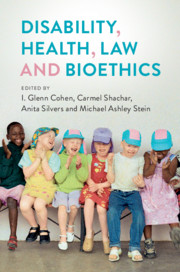Book contents
- Disability, Health, Law, and Bioethics
- Disability, Health, Law, and Bioethics
- Copyright page
- Dedication
- Contents
- Notes on Contributors
- Introduction
- Preface
- Acknowledgments
- Part I Disability: Definitions and Theories
- Part II Disability in the Beginning and the End of Life
- Introduction to Part II
- 4 Abortion, the Disabilities of Pregnancy, and the Dignity of Risk
- 5 The Down Syndrome Information Act and “Mere Difference”: Redefining the Scope of Prenatal Testing Conversations?
- 6 Dementia, Disability, and Advance Medical Directives: Defensible Standards for Dementia Care
- Part III Disability in the Clinical Setting
- Part IV Equality, Expertise, and Access
- Part V Disability, Intersectionality, and Social Movements
- Part VI Quantifying Disability
5 - The Down Syndrome Information Act and “Mere Difference”: Redefining the Scope of Prenatal Testing Conversations?
from Part II - Disability in the Beginning and the End of Life
Published online by Cambridge University Press: 08 April 2020
- Disability, Health, Law, and Bioethics
- Disability, Health, Law, and Bioethics
- Copyright page
- Dedication
- Contents
- Notes on Contributors
- Introduction
- Preface
- Acknowledgments
- Part I Disability: Definitions and Theories
- Part II Disability in the Beginning and the End of Life
- Introduction to Part II
- 4 Abortion, the Disabilities of Pregnancy, and the Dignity of Risk
- 5 The Down Syndrome Information Act and “Mere Difference”: Redefining the Scope of Prenatal Testing Conversations?
- 6 Dementia, Disability, and Advance Medical Directives: Defensible Standards for Dementia Care
- Part III Disability in the Clinical Setting
- Part IV Equality, Expertise, and Access
- Part V Disability, Intersectionality, and Social Movements
- Part VI Quantifying Disability
Summary
Since the very introduction of amniocentesis, prenatal testing for Down syndrome (DS) has raised objections from disability rights scholars and activists. The most well-known objection, the expressivist argument, claims that prenatal testing and selective terminations send a hurtful message to people living with the conditions tested for. Another claim is that selective abortion is a discriminatory practice because it lets one trait stand for the whole in justifying terminating an otherwise wanted pregnancy.
- Type
- Chapter
- Information
- Disability, Health, Law, and Bioethics , pp. 64 - 76Publisher: Cambridge University PressPrint publication year: 2020
- 4
- Cited by

